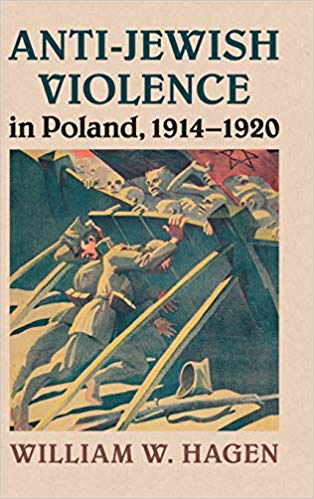Polonophobic Memes Pogroms Dusted Off Hagen

Anti-Jewish Violence in Poland, 1914-1920, by William W. Hagen. 2018
Revived 1918-Era Pogrom Tales. Much Ink About a Few Poles Knocking Around a Few Jews. Holocaust Industry. Is Predictably Silent About Earlier Jewish Violence to Poles
This book has one finding of value:
THE MYTH OF THE JEW AS THE DESIGNATED SCAPEGOAT
According to the long-promoted standard narrative, the Church, needing a scapegoat in order to consolidate its power over the masses, picked on (who else?) the defenseless Jew. If not the Church, then the Polish state or the Polish military did so. To his credit, author Hagen parts way with this Polonophobic meme, as he writes, “In this book’s voluminous documentation, no evidence surfaced of pogroms planned and unleashed from on high, whether by Christian Polish political parties or state, church, or army.” (p. 514).
HOLOCAUST INDUSTRY BEHIND THIS BOOK
Author William Hagen removes all doubt about what this book is for. He lambastes Jaroslaw Kaczynski, the chairman of Poland’s Law and Justice Party (PiS), for what he would have the reader believe is “rejecting Jewish Holocaust victims’ compensation claims for dispossessed property.” (p. vii). (A flat fib: It does no such thing. Poland has a viable restitution law, and qualified claimants receive compensation after going through the normal legal channels. Now, some Jews complain that Poland’s restitution law is “too restrictive” or “too slow”, but these are just opinions, and are certainly not synonymous with what Hagen calls a “rejecting Jewish Holocaust victims’ compensation claims”! Finally, the ultimate goal of the Holocaust Industry has little or nothing to do with Holocaust survivors. It is to force Poland to pay off self-appointed Jewish organizations, and through extralegal means.)
Hagen then gets it right as he quotes Kaczynski, “‘It would mean that the descendants of poor Poles would have to pay the descendants of those who were rich.'” (p. vii). But that is what extortion is all about.
HELLO. VIOLENCE BETWEEN POLES AND JEWS WENT BOTH WAYS
With few exceptions, this book is devoid of objectivity. Jews never do anything wrong: Poles only imagine that they do. Author William W. Hagen scrupulously avoids telling the reader that Jews also committed acts of violence (including murder) against Poles, as during the public agitation related to the 1905 Revolution in Russian-ruled Poland.
MORE A SLOPPY JOURNALISM THAN THE WORK OF A HISTORIAN
The author has amassed a large collection of largely-anecdotal information from sources of unclear credibility. Some of them are real winners. For instance, Hagen dusts-off hoary tales of General Jozef Haller’s men cutting the beards off Jews. These Jewish accusations had gotten so overused that Haller’s officers had made a joke of them.
Although Jedwabne (1941) is outside the purview of the time interval covered by this book (1914-1920), Hagen cannot resist the temptation to drag it in. In doing so, he uncritically cites the shoddy work of Jan T. Gross and Anna Bikont as fact. (p. 48). This does not inspire confidence in the veracity of other materials that Hagen admits into evidence.
UNDISGUISED POLONOPHOBIA: SOME GEMS FROM AUTHOR WILLIAM W. HAGEN
It soon becomes obvious that the author has a way with words. Permit two examples.
Henry Morgenthau had investigated the newspaper reports of massive Polish pogroms in Poland, and found them almost entirely unfounded. For that, Hagen would have us believe that Morgenthau, in Hagen’s words, “took an Olympian view of Poland’s ‘Jewish trouble’”. Hagen does not explain what exactly is so “Olympian” [lofty] about telling the truth. Is it because Morgenthau showed too much fairness to Poland? Or is it also because Morgenthau recognized the fact that Jews were partly responsible for Jewish-Polish antagonisms?
But wait, it gets even better. William Hagen complains that anti-Jewish violence has not gotten the attention he thinks it deserves because of what Hagen calls “triumphalist narratives of Polish recovery of independent statehood”. (p. 51). So Poles, who had struggled for 123 years under the lash of foreign oppressors before finally winning their freedom, now find out that they are “triumphalists”. Quite a turn of events.
And this year (2018 for 1918), I guess that, according to Hagen, Poles are celebrating 100 years of “triumphalism”. So be it.
To see a series of truncated reviews in a Category click on that Category:
- All reviews
- Anti-Christian Tendencies
- Anti-Polish Trends
- Censorship on Poles and Jews
- Communization of Poland
- Cultural Marxism
- German Guilt Dilution
- Holocaust Industry
- Interwar Polish-Jewish Relations
- Jewish Collaboration
- Jewish Economic Dominance
- Jews Antagonize Poland
- Jews Not Faultless
- Jews' Holocaust Dominates
- Jews' Holocaust Non-Special
- Nazi Crimes and Communist Crimes Were Equal
- Opinion-Forming Anti-Polonism
- Pogrom Mongering
- Poland in World War II
- Polish Jew-Rescue Ingratitude
- Polish Nationalism
- Polish Non-Complicity
- Polish-Ukrainian Relations
- Polokaust
- Premodern Poland
- Recent Polish-Jewish Relations
- The Decadent West
- The Jew as Other
- Understanding Nazi Germany
- Why Jews a "Problem"
- Zydokomuna